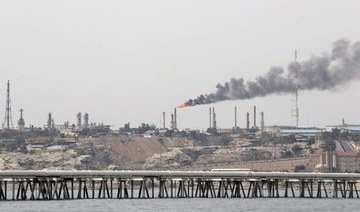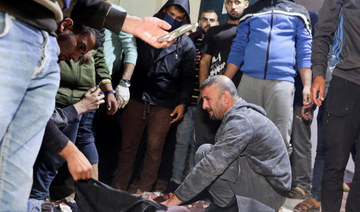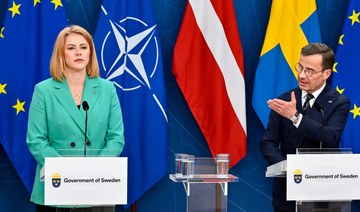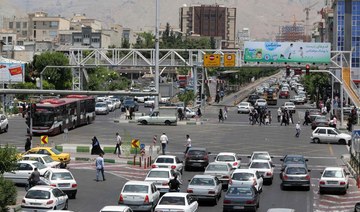ANKARA: A deal to buy Russian missiles has left Turkish President Recep Tayyip Erdogan balancing NATO ally the United States and new regional partner Russia as he risks fallout from both Washington and Moscow.
Turkey’s already soured relations with the United States could be significantly damaged with possible US sanctions if Ankara pushes ahead with the deal for the sophisticated S-400 missile defense system.
US officials have repeatedly warned the deal could threaten Turkey’s participation in the F-35 stealth fighter jet program.
But should Ankara renege on the missile purchase, Erdogan risks alienating Russia at a time when Moscow has become a pragmatic partner in Turkey’s strategy in Syria.
At risk would be a deal between Russia and Turkey to stop a Syrian regime offensive in a province controlled by jihadists.
Moscow would also likely hit back economically, experts say, perhaps by stopping millions of Russian tourists coming to Turkey.
Sanctions or fallout from either could not come at a worse time with Turkey’s economy in recession for the first time since 2009 following a currency crisis last year.
US sanctions that helped trigger that turmoil showed just how exposed Turkey’s economy can be.
US Department of Defense spokesman Charlie Summers recently warned Ankara faced “grave consequences” if Turkey took the S-400s, a serious threat according to analysts.
“The US government and Congress are not making idle threats when they warn Turkey not to proceed with the purchase of Russian S-400s,” Amanda Sloat, a senior fellow at the Brookings Institution, said.
“There are serious concerns in Washington as well as Europe about a NATO ally purchasing Russian defense equipment.”
The Americans fear technology from the S-400s would be able to gather data from NATO aircraft and allow Russians to access this information.
“There is the NATO set of issues of buying material that won’t be NATO interoperable and the effect that will have on alliance interoperability,” a senior US official said.
Erdogan says the S-400s are needed to protect Turkey’s borders, and said he turned to Russian equipment because no acceptable US missile deal was available at the time.
The first S-400 delivery is expected in July.
“For us to turn back from the deal is out of the question,” Erdogan said recently.
That could risk Ankara being sanctioned by Washington under the Countering America’s Adversaries Through Sanctions Act (CAATSA), experts say.
Under CAATSA, any entity doing business with Russia’s state and private defense and intelligence sectors risks sanctions.
Foreign Minister Mevlut Cavusoglu said last year Turkey would “absolutely respond” to any US sanctions.
US officials have repeatedly said Turkey’s involvement in the F-35 stealth fighter program should be curtailed if the Russia deal goes ahead.
Turkey plans to buy 100 F-35s and some Turkish pilots have already started training with counterparts in the US.
US General Curtis Scaparrotti this month reiterated that Washington should block delivery of the F-35s if Ankara completes the Russia agreement.
Turkey has invested over $1 billion in the F-35 program and any US decision to prevent the fighters reaching Turkey would be a breach of contract, but there are indications that Washington would be prepared to repay Ankara.
Hoping to supply an alternative to the S-400, Washington approved the sale of Patriot missiles to Ankara last year.
Turkey has no air defense system though NATO allies temporarily deployed Patriots to help defend the country from attack by Syrian jets in 2013.
Acting US Defense Secretary Patrick Shanahan on Tuesday said Turkey was “absolutely” wanted in the F-35 program but added: “We need Turkey to buy the Patriot.”
“We’re doing our best to give them as real and as credible and as urgent an alternative as possible,” the senior US official, who requested anonymity, said.
Cavusoglu on March 1 said Patriot negotiations had begun after a “positive” response.
But time is short. The formal offer for the Patriot expires at the end of March, according to media reports.
US-Turkey ties are already at a low point with tensions over US support for a Syrian Kurdish militia viewed as terrorists by Ankara, and Washington’s failure to extradite a Muslim preacher accused by Turkey of ordering a 2016 coup attempt.
Last summer, ties between the NATO allies hit another low with tit-for-tat sanctions and the US doubling steel and aluminum tariffs on Turkey over the case of a jailed American pastor.
That battered Turkey’s lira and the pastor was freed in October.
The missile row is “unlikely to cause a permanent rupture,” said Sloat, a former US State Department official. “It will significantly strain already challenged relations and raise further questions in Washington about whether Ankara is a reliable ally.”
Part of the concern is the burgeoning relationship between Erdogan and Russian President Vladimir Putin, with the Turkish leader expected in Russia in April.
While Turkish and US officials are talking privately, top-level discussions will likely wait until after Turkish local elections on Sunday.
Hande Firat, a Hurriyet daily columnist, said Cavusoglu will meet with US Secretary of State Mike Pompeo on a US trip in April and would likely discuss the S-400 dispute.
“How this will develop, we will see after the elections,” she wrote on Tuesday. “But discussions between US President (Donald) Trump and President Erdogan will be key.”
Erdogan juggles Moscow, Washington over Russia missile deal
Erdogan juggles Moscow, Washington over Russia missile deal
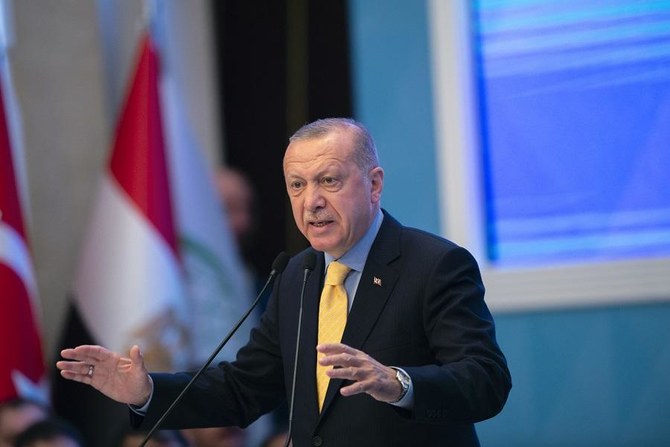
- Turkey’s already soured relations with the US could be significantly damaged with possible US sanctions if it pushes ahead with a controversial arms missile deal
- US officials have repeatedly warned the deal could threaten Turkey’s participation in the F-35 stealth fighter jet program
Kenya, Tanzania brace for cyclone as heavy rains persist

- The two East African neighbors are still recovering from last weeks devastating floods
- Kenya reported about 200 dead while Tanzaia said at least 155 died in floods and landslides
NAIROBI: Kenya and Tanzania were bracing Thursday for a cyclone on the heels of torrential rains that have devastated East Africa, killing more than 350 people and forcing tens of thousands from their homes.
In addition to claiming 188 lives in Kenya since March, the floods have displaced 165,000 people, with 90 reported missing, the interior ministry said, as the government warned citizens to remain on alert.
“Crucially, the coastal region is likely to experience Cyclone Hidaya, which will result in heavy rainfall, large waves and strong winds that could affect marine activities in the Indian Ocean,” the office of Kenyan President William Ruto said.
Neighbouring Tanzania, where at least 155 people have been killed in flooding and landslides, is also expected to feel the force of Hidaya.
“The presence of Hidaya Cyclone... is expected to dominate and affect the weather patterns in the country including heavy rain and strong winds in some Regions near Indian Ocean,” Tanzania Red Cross Society said on X, formerly Twitter.
Kenya’s capital Nairobi is among the areas expected to suffer heavy rains over the next three days, the Kenya Meteorological Department said on X, warning of strong winds and large ocean waves along the country’s coastline.
The forecaster urged residents to be vigilant for flash floods and lightning strikes, adding that strong winds could “blow off roofs, uproot trees” and cause other damage.
The heavier than usual rains have also claimed at least 29 lives in Burundi, with 175 people injured, and tens of thousands displaced since September last year, the United Nations said.
Earlier this week Ruto announced he was deploying Kenya’s military to evacuate everyone living in flood-prone areas.
In a bulletin released Thursday evening, the interior ministry ordered anyone living close to major rivers or near 178 “filled up or near filled up dams or water reservoirs” to vacate the area within 24 hours, warning that they would otherwise face “mandatory evacuation for their safety.”
The devastation has also affected Kenya’s tourism sector — a key economic driver — with some 100 tourists marooned in the famed Maasai Mara wildlife reserve on Wednesday after a river overflowed, flooding lodges and safari camps.
Rescuers later managed to evacuate 90 people by ground and air, the interior ministry said.
The area is currently inaccessible with bridges washed away, Narok West sub-county administrator Stephen Nakola told AFP, adding that about 50 camps in the reserve have been affected, putting more than 500 locals temporarily out of work.
There are no fatalities but communities living around the area have been forced to move away.
“Accessing the Mara is now a nightmare and the people stuck there are really worried, they don’t have an exit route,” Nakola said, adding that waterborne diseases were likely to emerge.
“I am worried that the situation could get worse because the rains are still on.”
In the deadliest single incident in Kenya, dozens of villagers were killed when a dam burst on Monday near Mai Mahiu in the Rift Valley, about 60 kilometers (40 miles) north of Nairobi.
The interior ministry said 52 bodies had been recovered and 51 people were still missing after the dam disaster.
Opposition politicians and lobby groups have accused Ruto’s government of being unprepared and slow to respond to the crisis despite weather warnings.
“Kenya’s government has a human rights obligation to prevent foreseeable harm from climate change and extreme weather events and to protect people when a disaster strikes,” Human Rights Watch said Thursday.
The United States and Britain have issued travel warnings for Kenya, urging their nationals to be cautious amid the extreme weather.
The devastation has sparked an outpouring of condolences and pledges of solidarity from all over the world, including from Pope Francis and UN Secretary General Antonio Guterres.
The rains have been amplified by the El Nino weather pattern — a naturally occurring climate phenomenon typically associated with increased heat worldwide, leading to drought in some parts of the world and heavy downpours elsewhere.
UK’s foreign secretary supported arms sales to Israel days after British aid workers killed in Israeli strike
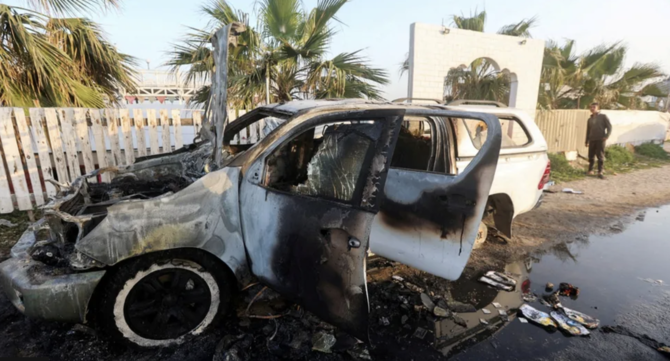
- Attack on World Central Kitchen convoy killed 7 people in total
LONDON: Britain’s foreign secretary recommended that the UK continue selling arms to Israel just days after an Israeli strike on a World Central Kitchen convoy killed three British aid workers.
David Cameron supported the continuation of arms sales two days after the strike on April 1, and the Secretary of State for Business and Trade Kemi Badenoch approved the decision on April 8, The Guardian reported on Thursday.
Cameron said earlier this week that the strike that killed the Britons, in addition to four aid workers of other nationalities, revealed systemic and personal failures by members of the Israel Defense Forces.
Cameron’s decision seems to have been based on an assessment of Israeli compliance with humanitarian law that did not cover the deaths of the aid workers due to a time lag in the government’s process for deciding if British arms exports were at risk of being used to commit war crimes.
There was a possibility that the business department’s assessment did not cover any incidents after Jan. 28.
An update on the handling of arms export licenses that took into consideration events up until the end of February was prepared, but the British Foreign Office has declined to say if that was included in the advice given to ministers.
Opposition Labour MPs claim the time delay means there is a possibility that no comprehensive ministerial-level assessment of Israel’s conduct of the war in Gaza has been made in the last three months.
Lawyers and campaigners who have examined the evidence provided by the Foreign Office have come to the same conclusion.
World Central Kitchen said on Monday it would resume operations in the Gaza Strip, a month after the Israeli airstrike.
Prior to halting operations, WCK had distributed more than 43 million meals in Gaza since October, representing by its own accounts 62 percent of all international nongovernmental aid.
NATO condemns Russian ‘malign activities’ on its territory

- The incidents “are part of an intensifying campaign of activities” Russia is carrying out across the Euro-Atlantic area
- NATO allies “express their deep concern over Russia’s hybrid actions, which constitute a threat to allied security“
BRUSSELS: NATO on Thursday condemned Russian “malign activities” on its territory, saying actions like disinformation, sabotage, violence and cyber interference threatened the alliance’s security.
The incidents “are part of an intensifying campaign of activities” Russia is carrying out across the Euro-Atlantic area and NATO allies “express their deep concern over Russia’s hybrid actions, which constitute a threat to allied security,” NATO said in a statement.
Authorities in the Czech Republic, Estonia, Germany, Latvia, Lithuania, Poland and Britain have recently investigated and charged people in connection with “hostile state activity.”
NATO said allies would work together to deter and defend against the hybrid actions and that they would remain steadfast in supporting Ukraine as it struggles to fend off Russia’s invasion, now in its third year.
Last month, a 20-year-old British man was charged with masterminding an arson plot against a Ukrainian-linked target in London. Moscow’s ambassador Andrey Kelin dismissed claims of links to Russia as “absurd” and “unfounded.”
In late March, Czech authorities said they had busted a Moscow-financed network that spread Russian propaganda and wielded influence across Europe, including in the European Parliament.
Israeli private eye arrested in UK over alleged hacking for US PR firm

- An initial attempt to extradite Amit Forlit to the United Sates was thrown out by a judge at Westminster Magistrates’ Court on Thursday
- Forlit was arrested under an Interpol red notice at London’s Heathrow Airport
LONDON: An Israeli private investigator wanted by the United States was arrested in London over allegations that he carried out a cyberespionage campaign on behalf of an unidentified American PR firm, a London court heard on Thursday.
An initial attempt to extradite Amit Forlit to the United Sates was thrown out by a judge at Westminster Magistrates’ Court on Thursday on a legal technicality.
Amy Labram, a lawyer representing the United States, had told the court that Forlit “is accused of engaging in a hack for hire scheme.”
Labram said that the US allegations include that an unnamed Washington-based PR and lobbying firm paid one of Forlit’s companies 16 million pounds ($20 million) “to gather intelligence relating to the Argentinian debt crisis.”
Forlit was arrested under an Interpol red notice at London’s Heathrow Airport as he was trying to board a flight to Israel, according to the USauthorities.
Forlit is wanted in the US on three charges: one count of conspiracy to commit computer hacking, one count of conspiracy to commit wire fraud and one count of wire fraud.
A judge ruled that the attempt to extradite Forlit by the United States could not continue as he was not produced at court within the timeframe required under British extradition law.
“He was not produced at court as soon as practicable and the consequences of that ... he must – I have no discretion – he must be discharged,” Judge Michael Snow ruled.
Forlit and his lawyer did not immediately return messages seeking comment. The Federal Bureau of Investigation did not immediately return a message.
Forlit has separately been accused of computer hacking in New York by aviation executive Farhad Azima. Azima, whose emails were stolen and used against him in a 2020 trial in London, is suing Forlit and others in federal court in Manhattan.
Forlit has previously acknowledged retrieving Azima’s emails but has denied hacking, telling Reuters he innocently stumbled across the messages “on the web.”
Death toll jumps to at least 48 as a search continues in southern China highway collapse
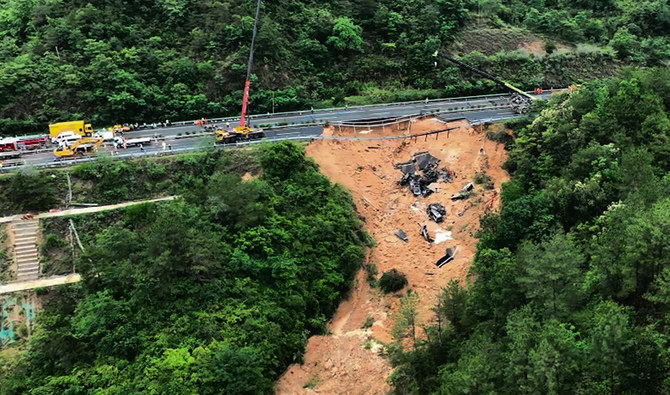
- One side of four-lane highway in Meizhou city gave way after a month of heavy rains
- Twenty-three vehicles fell down a steep slope, some sending up flames as they caught fire
BEIJING: The death toll from a collapsed highway in southeastern China climbed to 48 on Thursday as searchers dug for a second day through a treacherous and mountainous area.
One side of the four-lane highway in the city of Meizhou gave way about 2 a.m. on Wednesday after a month of heavy rains in Guangdong province. Twenty-three vehicles fell down a steep slope, some sending up flames as they caught fire. Construction cranes were used to lift out the burnt-out and mutilated vehicles.
Officials in Meizhou said three other people were unidentified, pending DNA testing. It wasn’t immediately clear if they had died, which would bring the death toll to 51. Another 30 people had non-life-threatening injuries.
The search was still ongoing, Meizhou city Mayor Wang Hui said at a late-afternoon news conference. No foreigners have been found among the victims, he said.
Search work has been hampered by rain and land and gravel sliding down the slope. The disaster left a curving earth-colored gash in the otherwise verdant forest landscape. Excavators dug out a wider area on the slope.
“Because some of the vehicles involved caught fire, the difficulty of the rescue operation has increased,” said Wen Yongdeng, the Communist Party secretary for the Meizhou emergency management bureau.
“Most of the vehicles were buried in soil during the collapse, with a large volume of soil covering them,” he said.
He added that the prolonged heavy rainfall has saturated soil in the area, “making it prone to secondary disasters during the rescue process.”
Over 56 centimeters (22 inches) of rain has fallen in the past four weeks in the county where the roadway collapsed, more than four times as much as last year. Some villages in Meizhou flooded in early April, and the city has seen more rain in recent days.
Parts of Guangdong province have seen record rains and flooding in the past two weeks, as well as hail. A tornado killed five people in Guangzhou, the provincial capital, during rain and hail storms last weekend.
The highway section collapsed on the first day of a five-day May Day holiday, when many Chinese are traveling at home and abroad.
Chinese leader Xi Jinping said that all of China’s regions should improve their monitoring and early warning measures and investigate any risks to ensure the safety of the public and social stability, state broadcaster CCTV said.




